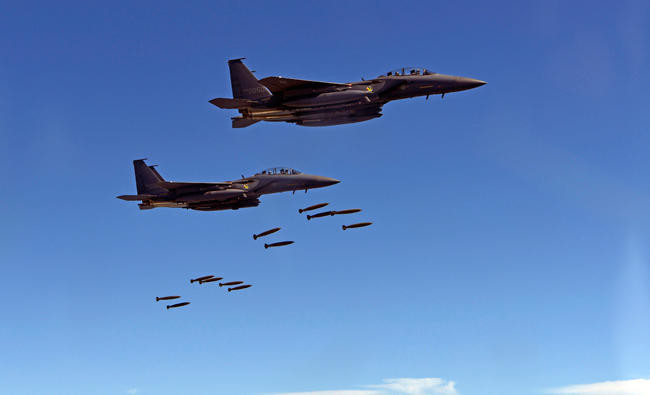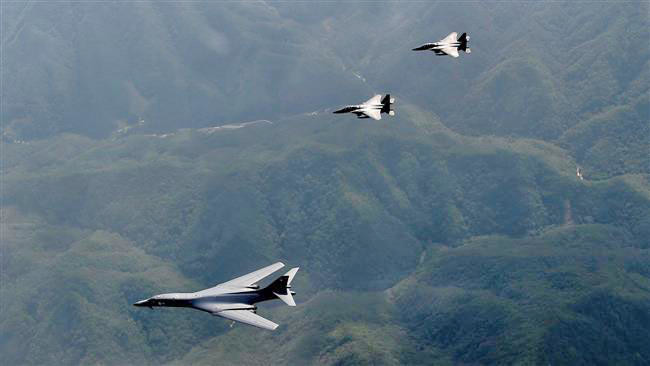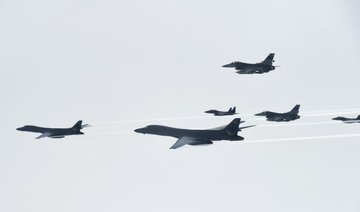SEOUL/TOKYO: US heavy bombers and stealth jet fighters took part in a joint live fire drill in South Korea on Thursday, intended as a show of force against the North after its latest missile launch.
“South Korean and US air forces conducted an air interdiction exercise in order to strongly cope with North Korea’s repeated firing of ballistic missiles and development of nuclear weapons,” the South’s air force said in a statement.
Two B-1B “Lancer” bombers from Guam and four F-35B stealth jet fighters from the Marine Corps’ Iwakuni air base in Japan conducted the drill, with four South Korean jet fighters also taking part.
B-1B overflights of the peninsula from Guam, a US territory in the Pacific, infuriate the North, which cited them when it announced a plan to fire a salvo of missiles toward the island.
“North Korea’s actions are a threat to our allies, partners and homeland, and their destabilizing actions will be met accordingly,” said General Terrence J. O’Shaughnessy, Pacific Air Forces commander, who made an unscheduled visit to Japan.
“This complex mission clearly demonstrates our solidarity with our allies and underscores the broadening cooperation to defend against this common regional threat. Our forward deployed force will be the first to the fight, ready to deliver a lethal response at a moment’s notice if our nation calls.”
North Korea has made no secret of its intention to develop the knowhow to launch a nuclear-tipped missile at the United States and has recently threatened the US Pacific territory of Guam. It denounced the US exercises in traditionally robust fashion.
“The US imperialists and the south Korean puppet forces do not hide their bellicose nature, claiming that the exercises are to ‘counter’ the DPRK’s ballistic rocket launches and nuclear weapons development,” the North’s KCNA news agency said, referring to North Korea by its official name, the Democratic People’s Republic of Korea (DPRK).
“But the wild military acts of the enemies are nothing but the rash act of those taken aback by the intermediate-to-long range strategic ballistic rocket launching drill conducted by the army of the DPRK as the first military operation in the Pacific.”
'Fire and fury’
US President Donald Trump has warned North Korea it would face “fire and fury” if it threatened the United States and that the US military was “locked and loaded” in case of any provocation.
Trump on Wednesday declared “talking is not the answer” to resolving the long-standing impasse.
“The US has been talking to North Korea, and paying them extortion money, for 25 years,” Trump, who last week said North Korean leader Kim Jong Un was “starting to respect” the United States, wrote on Twitter.
However, US Defense Secretary Jim Mattis, when asked by reporters just hours later if the United States had run out of diplomatic solutions with North Korea, replied: “No.”
“We are never out of diplomatic solutions,” Mattis said before a meeting with his South Korean counterpart at the Pentagon. “We continue to work together, and the minister and I share a responsibility to provide for the protection of our nations, our populations and our interests.”
Japanese Defense Minister Itsunori Onodera spoke to Mattis by telephone and agreed to keep putting pressure on North Korea in a “visible” form, Japan’s defense ministry said. Japanese Prime Shinzo Abe said he and visiting British Prime Minister Theresa May agreed to urge China, North Korea’s lone major ally, to do more to rein in the North.
They also discussed the possibility of adopting a new UN Security Council resolution over North Korea, a British government source said.
Sanctions options
The 15-member Security Council on Tuesday condemned the firing of an intermediate range ballistic missile over Japan as “outrageous” and demanded that North Korea halt its weapons program, but the US-drafted statement did not threaten new sanctions.
Japan was pushing the United States to propose new UN Security Council sanctions, which diplomats said could target North Korea’s laborers working abroad, oil supply and textile exports.
Diplomats expected resistance from Russia and fellow veto-wielding power China, particularly given new measures were only recently imposed after North Korea staged two long-range missile launches in July.
A US ban on travel to North Korea comes into effect on Friday, curbing one of its few remaining supplies of foreign currency.
China again urged restraint from all parties.
Defense ministry spokesman Ren Guoqiang told a monthly briefing that China would never allow war or chaos on the Korean peninsula, its doorstep, and military means were not an option.
“China strongly demands all sides to exercise restraint and remain calm and not do anything to worsen tensions,” Ren said, adding that Chinese forces were maintaining a normal state of alert along the North Korean border.
Chinese foreign ministry spokeswoman Hua Chunying said the situation on the peninsula was serious.
“I also want to stress that the current tense situation on the peninsula isn’t a screenplay or a video game,” she told reporters.
“It’s real, and is an immense and serious issue that directly involves the safety of people from both the north and south of the peninsula, as well as peace and stability of the entire region.”
‘Key milestone’
The Pentagon’s Missile Defense Agency and the crew of the guided-missile destroyer USS John Paul Jones conducted a “complex missile defense flight test” off Hawaii on Wednesday, resulting in the intercept of a medium-range ballistic missile target, the agency said.
The agency’s director, Lt. Gen. Sam Greaves, called the test “a key milestone” in giving US Navy Aegis Ballistic Missile Defense ships an enhanced capability, but did not mention North Korea.
The United States and South Korea are technically still at war with North Korea because their 1950-53 conflict ended in a truce, not a peace treaty.
North Korea routinely says it will never give up its weapons programs, calling them necessary to counter perceived American hostility.



























